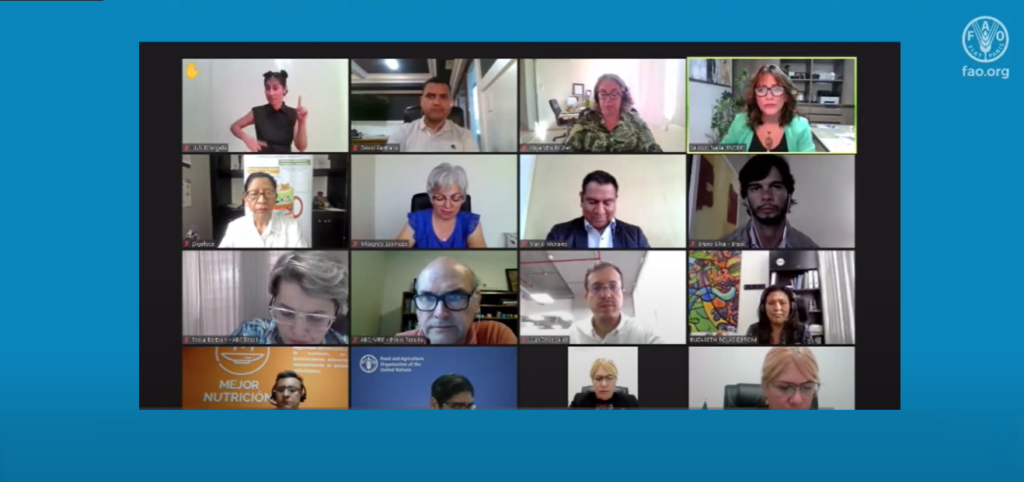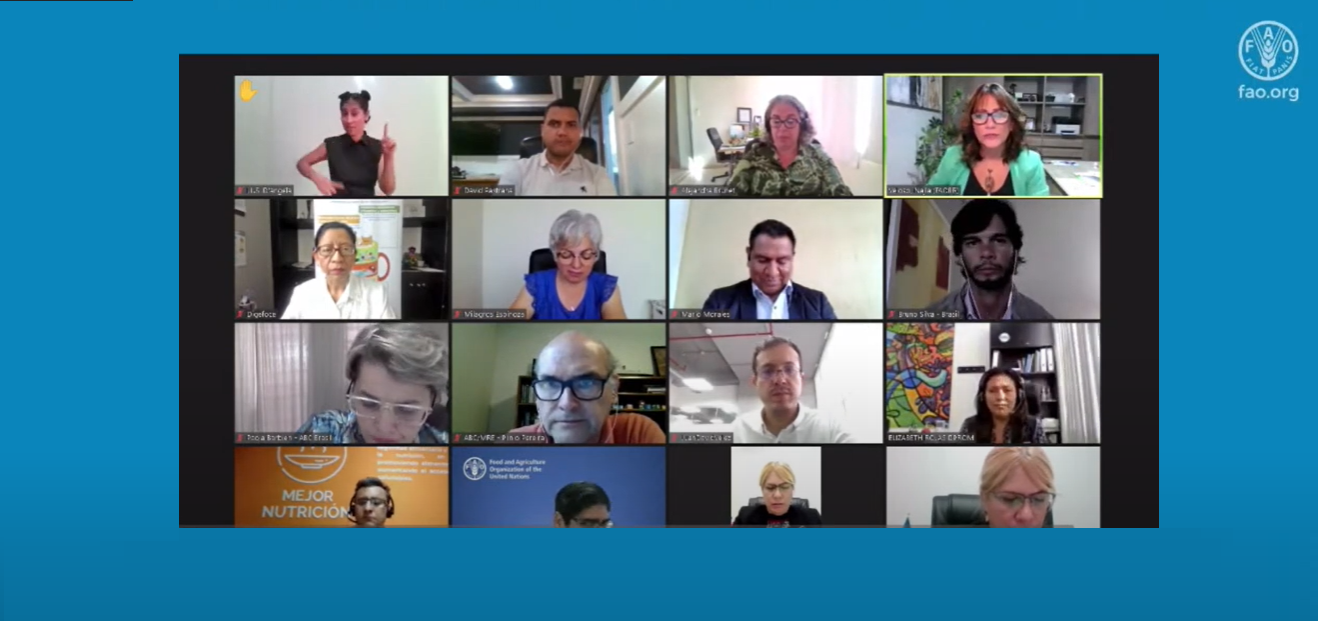Training integrates the actions of the Sustainable School Feeding Network (RAES), promoted by the Government of Brazil with the support of FAO.
Santiago de Chile, May 10, 2022 – The third edition of the course ‘School Feeding as an Educational Strategy for a Healthy Life’, began on May 4 with an open virtual class broadcast on social networks. The live acvitity reached an audience of more than 3,000 people.
In the 2022 edition, about 3,200 professionals from Colombia, Guatemala, Peru and the Dominican Republic will participate in the pre-recorded classes, during 13 weeks. In the last two editions, almost 5,000 professionals from the region were trained.
The course integrates the activities of the project Consolidation of School Feeding Programs in LAC, an initiative of the Brazil-FAO International Cooperation Program carried out jointly by the Food and Agriculture Organization (FAO), the Brazilian Cooperation Agency of the Ministry of Foreign Affairs (ABC/MRE) and the National Fund for the Development of Education (FNDE). It is also an initiative of the Sustainable School Feeding Network (RAES), promoted by the Government of Brazil.
The opening class was held during the webinar ‘Sustainable Schools: A decade of transformation of school feeding, with a focus on the human right to adequate food’, which celebrated 10 years of this methodology implemented in the region. On the occasion, the study ‘The Situational Status of Sustainable Schools in Latin America and the Caribbean – 2021’, produced within the framework of the school feeding project, was presented.
Plínio Pereira, representing ABC/MRE, highlighted that the interest, the number of participants and the positive results of the previous editions of the course constitute important achievements for South-South technical cooperation, whose focus is the development of local capacities based on the exchange of successful practices. “At a time when the world community accelerates efforts to find transformative solutions for food systems and guarantee access to healthy, safe and sustainable food, this publication and the course put South-South Cooperation in Latin America and the Caribbean fully in line with such purpose“.
The coordinator of the National School Feeding Program (PNAE) of Brazil, carried out by FNDE, Karine Santos, reinforced the commitment of the Government of Brazil with South-South cooperation and highlighted the relevance of education and training of the actors involved in this public policy. “Strengthening all levels of government, on all fronts of action, is very important“.
In the opinion of the FAO Nutrition Officer, Israel Ríos, having trained 5,000 professionals in the two last versions is a fabulous achievement of the course. He added that the Sustainable School Feeding Network, the RAES, through its platform available in three languages, facilitates the opportunities to exchange knowledge and lessons learned among countries.

“We are going to empower ourselves on issues such as the Sustainable Development Goals (SDG), the human right to adequate food, food security, food and nutrition education, school gardens and many others,” said Milagros Espinoza, course coordinator. The two tutors, Alejandra Brunet and David Pastrana, also briefly greeted the participants.
The course
The course seeks to promote reflection and understanding about the importance of public school feeding policies as strategies to promote the Sustainable Development Goals (SDG), food and nutritional security, education, health, nutrition, social protection and care for the environment, including in the context of pandemic and post-pandemic. In addition, the training has the objective of strengthening the capacities of professionals working in the areas of nutrition, education, health, agriculture and others for the development, implementation and monitoring of food and nutrition education actions within the framework of school feeding (SFP).
Countries
Juan David Vélez, deputy director general of the Special Administration Unit for School Feeding in Colombia, pointed out the high participation of students from his country – nearly 900 professionals – from the different areas of the educational community. In addition, he stressed that learning how this policy is carried out in other territories provides a great advance. “The Brazil-FAO Cooperation has already achieved a lot training 5,000 different actors from the entire region“.
From Guatemala, Liliana Ventura, representative of the General Directorate for Strengthening the Educational Community (Digefoce), commented that the course is an excellent training opportunity. “I reiterate my gratitude to everyone who makes this training possible and to the participants for taking this opportunity. May this investment of time be used 110% and be translated into visible and concrete improvements in our educational communities.“
In turn, Elizabeth Rojas Lara, executive director of Health Promotion in Peru, said that this virtual course is important because it will allow professionals to be able to develop, implement and monitor actions related to school feeding, especially food and nutrition education.
Ocirema Caminero, chief of staff of the National Institute of Student Welfare (Inabie) of the Dominican Republic evaluated: “The course represents a tool of great importance for the strengthening of SFP throughout the region due to the positive implications it has in nutrition, in environment, in production and with a human approach, which is the most important thing“.
The FAO representative in the Dominican Republic, Rodrigo Castañeda, said that the Brazil-FAO International Cooperation has been a pioneer in promoting these school feeding programs in the region in the last decade and highlighted the important role of Sustainable Schools. “These are experiences that serve to make continuous improvements. In addition, they are an institutional market for smallholder farmers and an opportunity to improve the environment and education.“
“School feeding is a very important issue in our organization and this course serves as an inspiration for other projects. We are very happy to be part of this movement,” said Paola Barbieri, an ABC project analyst, at the closing of the event. “You are going to be the great agents of change in the countries.“
Content originally published in the website of the FAO-Brazil International Cooperation.



